Has an enduring predisposition to authoritarianism been activated in the US that will continue to destabilise its domestic politics? If so, the US could become an unreliable ally. Should Australia be imagining a post-alliance future?
Read more

Has an enduring predisposition to authoritarianism been activated in the US that will continue to destabilise its domestic politics? If so, the US could become an unreliable ally. Should Australia be imagining a post-alliance future?
Read more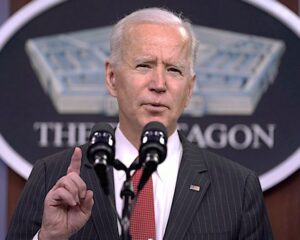
In the first military action authorised by US President Joe Biden, the United States carried out air strikes against facilities used by “Iranian-backed militia” in eastern Syria on Thursday, 25 February 2021 (early on Friday Middle Eastern time).
Read more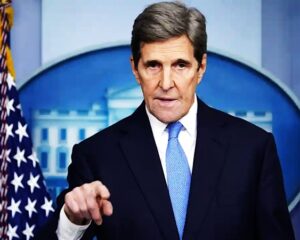
The United States officially rejoined the Paris Climate Agreement on 19 February 2021. The US Secretary of State, Antony Blinken, issued a Statement in which he called the rejoining “momentous”, but noted that “what we do in the coming weeks, months, and years is even more important”. You have seen and will continue to see us weaving climate change into our most important bilateral and multilateral conversations at all levels. In these conversations, we’re asking
Read more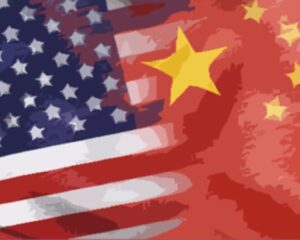
The Biden administration faces a host of difficult problems, but in foreign policy its thorniest will be its relations with the People’s Republic of China. How the new administration handles issues of trade, security, and human rights will either allow both countries to hammer out a working relationship or pull the U.S. into an expensive — and unwinnable — cold war. But there are a number of moves both countries could make to avoid this.
Read more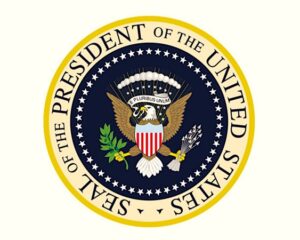
In remarks to Defense personnel on Wednesday, 10 February 2021, US President Biden said that a Pentagon ‘China task force’ will, within the next few months, review the US’s “[defense] strategy and operational concepts, technology, and force posture, and so much more”. Recommendations on key priorities and decision points are expected to enable the US to “chart a strong path forward on China-related matters”.
Read more
The United States today [Monday, 8 February 2021] announced plans to reengage with the U.N. Human Rights Council. The US withdrew from the UNHRC three years ago, citing concerns about the Council’s focus on Israel. “The Biden administration has recommitted the United States to a foreign policy centered on democracy, human rights, and equality,” Secretary of State, Antony Blinken, said in a statement. “Effective use of multilateral tools is an important element of that vision.” The
Read more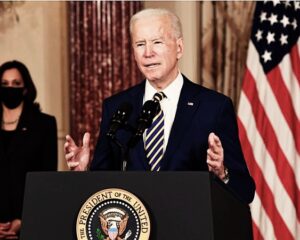
On Thursday 4 February 2021, US President Biden gave his first speech dealing with foreign policy issues at the Department of State in Washington. Amongst other things, he took a strong position on China and Russia, and called for the release of Alexei Navalny and Aung San Suu Kyi, and an end to the war in Yemen.
Read more
President Biden’s recognition of climate change, and determination to shift science to the centre of climate policy is important, and welcome. But a program that “achieves a carbon pollution-free power sector by 2035 and puts the US on an irreversible path to a net-zero economy by 2050” will not be enough. Adaptation to a 3.0°C temperature rise this century must now be a focus for governments.
Read more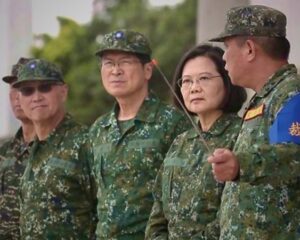
For Australia, the question of Taiwan remains a ‘wicked’ strategic problem. The Taiwanese have over time established strong claims for their autonomy. The US has a huge investment in Taiwan’s security, while not denying it is part of China. And defence of Taiwan could see the island devastated, the ANZUS alliance become irrelevant, and Australia’s security lost. Why would Australia go to war over Taiwan?
Read more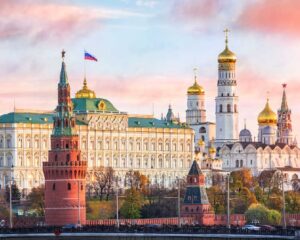
US President Biden and Russia’s President Putin spoke by telephone on 26 January 2021 and agreed to extend the New Strategic Arms Reduction Treaty for five years. It is the last remaining nonproliferation agreement between the US and Russia.
Read more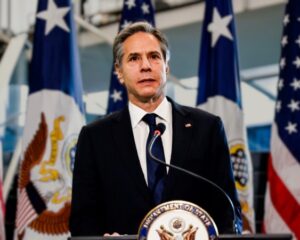
The Biden administration is reviewing pending arms sales, including controversial arms sales to Saudi Arabia and the United Arab Emirates (UAE) authorised by former President Donald Trump. The review includes the sale of precision-guided munitions to Saudi Arabia, and F-35 fighters and armed drones to the UAE.
Read more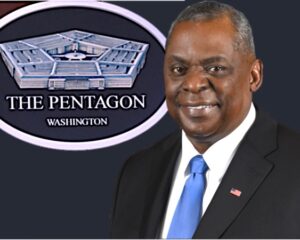
Following US President Biden’s new orders that establish “climate considerations as an essential element of U.S. foreign policy and national security,” the Secretary of Defense released a Statement confirming that “[Climate change] is a national security issue, and we must treat it as such”.
Read more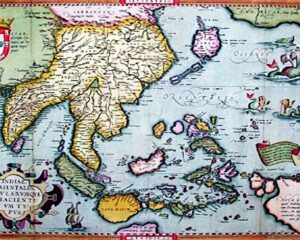
In the dying days of the most chaotically dysfunctional presidency in living memory, outgoing officials in Washington declassified the Trump administration’s Strategic Framework for the Indo-Pacific. At issue is not only the contents of this document, but the manner and timing of its release and further, what its reception in Australia says about Australia’s relationship with the United States, and whether it shapes expectations for the new Biden presidency.
Read more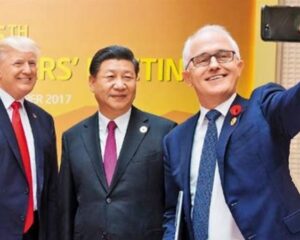
On 12 January 2021, the outgoing Trump administration released a declassified document titled em>United States Strategic Framework for the Indo-Pacific. The document was declassified some thirty years ahead of schedule to enable its early public release. This unusual step by an outgoing US administration has seen the emergence of a range of views on the merits of the document, and the intention behind its early release.
Read more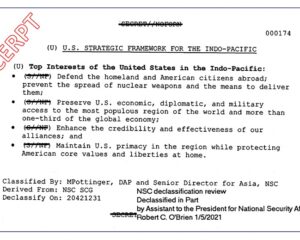
On 12 January 2021, the then US National Security Advisor, Robert O’Brien, released a declassified document titled the United States Strategic Framework for the Indo-Pacific. The document was declassified for release on 5 January 2021, thirty years before this was due, in the last days of the outgoing Trump Administration. What should an Australian analyst make of this document?
Read more
Ironically, Christian nationalist opposition to religious liberty has plagued American democracy since before the Revolution, and a strong authoritarian strain still runs through American religious thinking. The Trump Administration provided disturbing evidence of how Christian nationalists have penetrated key political institutions, with eclipse of constitutional liberal democracy by a competing virtual theocracy as their aim.
Read more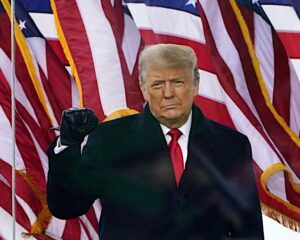
Trump’s 1776 Commission Report, released on 18 January 2021, puts forward ideas that are designed to give shape and logic to the notions of extremists. It is a dangerous document that provides the façade of a coherent political philosophy to hide, and to disguise, the rising illiberalism in America. The final conclusion is chilling, comparing the contemporary situation in America with previous crises that were resolved by violence and insurrection.
Read more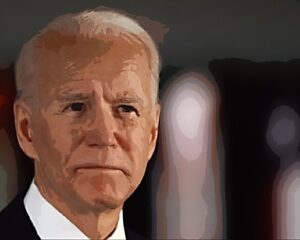
If President Biden produces a National Security Strategy in 2021, Australia should hope for a major shift away from that of President Trump. But not an uncritical return to the 2015 version of President Obama. If stability and a workable international system are the outcomes the Biden Administration seeks, then three deeply interwoven issues need to be given serious attention: leadership, democracy, and sovereignty.
Read more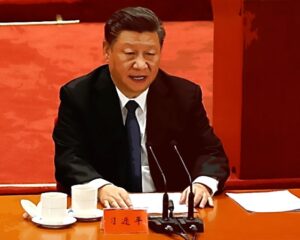
A report from the Centre for Economics and Business Research (United Kingdom), released on 26 December 2020, has forecast that China will overtake the United States to become the world’s biggest economy in 2028, five years earlier than previously estimated, due to the contrasting recoveries of the two countries from the COVID-19 pandemic.
Read more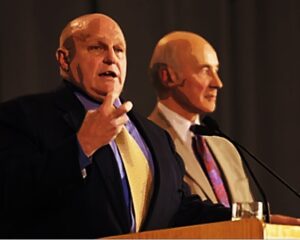
Richard Armitage and Joseph Nye, long time pillars of the Washington national security policy elite, are the lead authors of a new report from CSIS on the US-Japan alliance, with a suggested “new agenda for the challenges and opportunities on the horizon”. It is deeply refreshing to see them acknowledge, albeit somewhat wistfully, that there is no going back to US hegemony. To exercise influence the US will have to partner with other states.
Read more